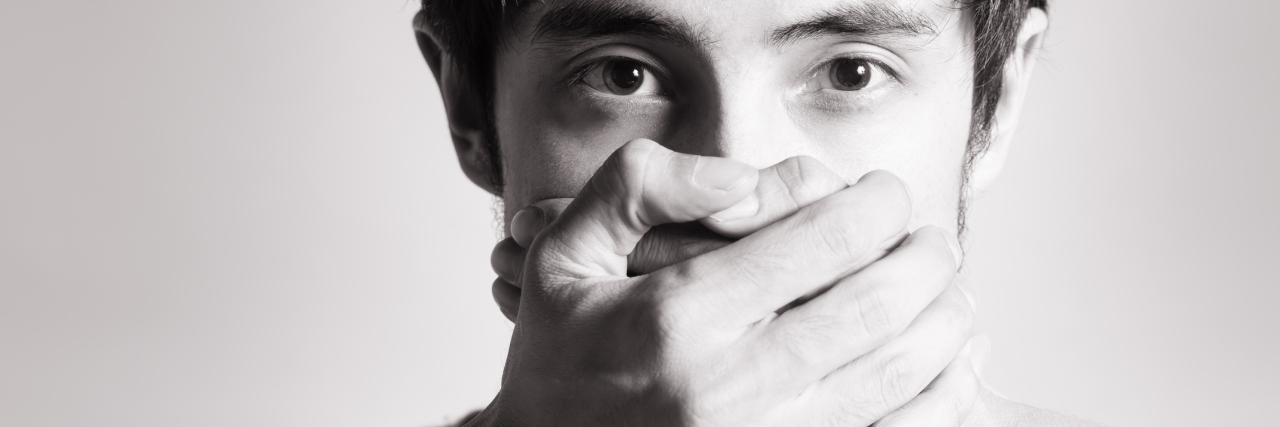When my anxiety spikes I start to experience tics — a sudden, repetitive, non-rhythmic movement involving a distinct muscle group, like an eye twitch.
I wouldn’t call a tic involuntary per say (they’re definitely not wanted), maybe semi-voluntary.
Let me try to explain. You know that feeling when you get an itch that you have to scratch it. The longer you don’t, the worse it itches; until you finally give in to that sweet relief.
A tic is similar to that. I can feel it coming, and can try to hold it back; until the feeling is too much. (I find holding it in makes the tic more violent than just getting it over with.)
Over the years, I’ve gone through a number of different tics, some less noticeable than others, some more painful than others. I’ve gone through tapping my leg, swatting myself in the face, opening and closing my hand, a kind of half shoulder shrug thing (that’s still my main one), looking up (that’s my secondary one), flicking my tongue, and the list goes on.
When I feel that “itch” I don’t fight it anymore. I’ve learned that fighting just makes it worse. It will go from a single tic, to a rapid concession of them from holding it. It’s also painful to hold it in, and tiring. And most of the time other people don’t even notice.
When my anxiety is bad, the tics go haywire. I had one day where my eyes kept winking/grimacing; I couldn’t even keep my glasses on. My eyelids wouldn’t stop moving for the entire day.
Another time I was doing the half shoulder shrug thing; well my anxiety was making it happen one after the other. And violently, my ear was turning red from my shoulder hitting it.
There’s a newish tic taking over my life. I’m calling it a vocal tic, because it has the same characteristics of a tic. Stuttering.
Lately I’ve been stuttering when I’m anxious; it came on suddenly, and I don’t have a history of stuttering (except in high school and I did have a speech impediment as a kid, but it wasn’t a stutter, more of a drunken mumble.)
It’s the classic Porky Pig, Piglet type. You know, “Th-th-th-th-that’s all f-f-folks” and “Oh d-d-d-d-dear.”
Do you have any idea how frustrating it is for your mouth to refuse to work with your brain. To have your thoughts literally stuck in your head, unable to communicate. Opening your mouth, but your throat forgets how to make sounds.
Then, because of your anxiety, you get anxious thoughts about being frustrating and a nuisance to the others around you. Having to spend five times as long on a simple sentence. It feels like your brain is laughing at you.
And it’s not just repeating sounds and words; there’s also a block. When you’re speaking and suddenly there’s an invisible wall keeping any sound from coming out.
I think I’m the only person who actually likes it when people finish my sentences or words. Because then I feel like, phew, this is over now.
Speaking turns into a spike and relief of anxiety. Stuck on a word, spikes the anxiety; and then when it comes out the anxiety stops. It’s like a rollercoaster.
Anxiety is the cause and aggravator of my stuttering. I can start the day fluent, then by mid-morning I’m tripping up over words (mornings are when my anxiety naturally spikes without cause). If there are causes to increase my anxiety levels, even just a bunch of teeny, tiny things, I soon go from tripping over a few words a sentence to every word. At it gets worse; no words come out, just jagged, sounds. As my anxiety diminishes, my fluency increases; I’m like a verbal anxiety thermometer.
I have to remember to take a minute and breath. Slow down. It doesn’t help that my brain is usually running around like the Energizer Rabbit hopped up on caffeine.
I don’t know how it is for others, but stuttering is frustrating — it makes me angry at myself. I want to curse profanities (King’s Speech reference anyone?) and I’ve only sworn twice in my life. It’s tiring.
I’m extremely lucky (it doesn’t feel like it, but I am) that my co-workers are OK with it. That really helps take the edge off, as well as their reminders to breath while I’m working myself up. And they don’t mind when I ask them to answer the phone for me.
Other people aren’t as accepting. I deal with customers at work (the irony isn’t lost on me) and their range of reactions is quite astonishing. Some get frustrated and impatient, huffing and puffing and sighing. Trying to hurry me along by speaking for me (which just makes me stutter harder). I’ve had a few who’ve refused to speak with me, leaving mid-sentence to find someone else or just walking away. Some act super nice or pity me. (Compared to the alternative, I’ll take it.) I had one customer tell me to “just spit it out already.” Thankfully, the majority of customers don’t care, or I don’t notice they care.
I joke around with it, start quoting Porky Pig and use self-deprecating humor. Others join in, and humor helps. Humor makes it seem less serious than it is; and it relieves the anxiety a bit to help me speak more fluently. Laughter really is the best medicine.
Follow this journey here.
Getty image via kieferpix

